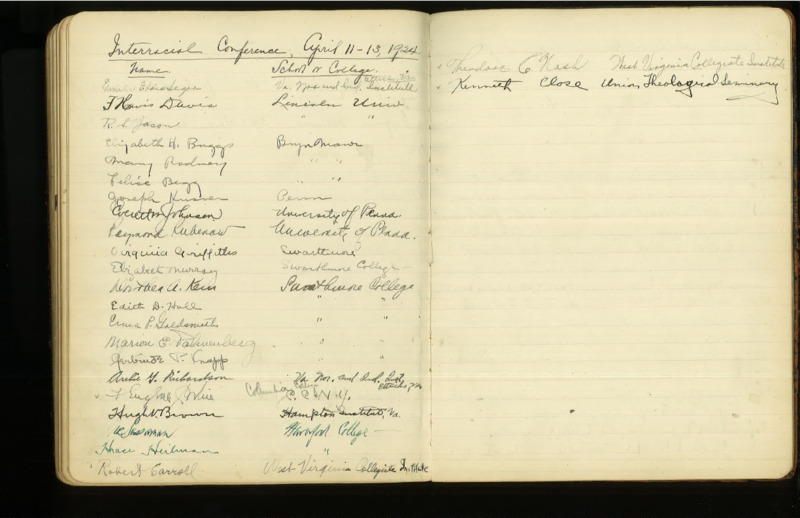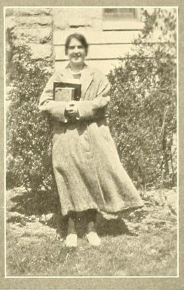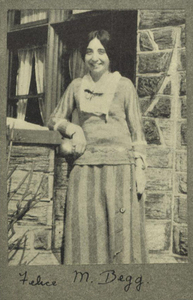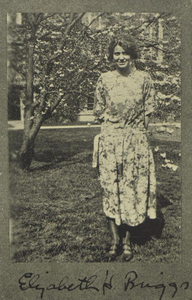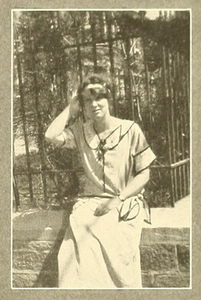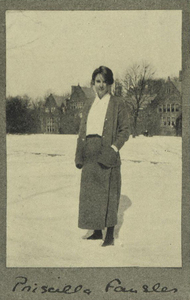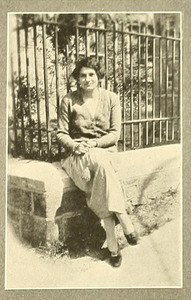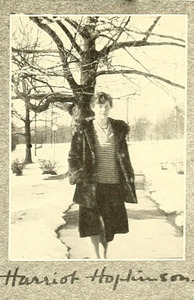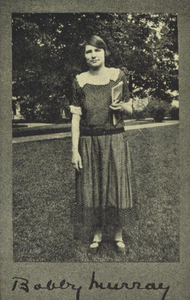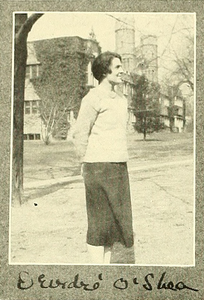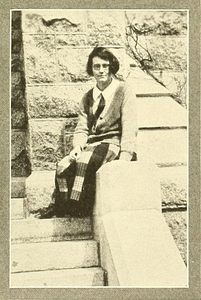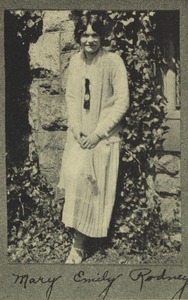People
The 1924 conference was entirely student-led. The only people present, other than the delegates, were the hostesses at the Woolman School.1 Many delegates were actively involved in their communities and colleges. For example, Marion Palmenberg from Swarthmore College was elected freshman representative to the Executive Board of Swarthmore's student government.2 F. Eugene Corbie, of the City College of New York, was an esteemed Trinidadian activist (more below). Hugh Victor Brown from Hampton Institute was an educational leader who wrote several books addressing education and people of African descent in America.3 Robert Carroll, of West Virginia Collegiate Institute, was the president of Alpha Zeta, a historically Black fraternity.4
Delegates from other Colleges
From the conference's guest list, we know that the following students attended the 1924 conference. Emily Eloise Segar and Archive G. Richardson represented the Virginia Normal and Industrial Institute. Attending from Lincoln University were F. Haris Davis and R.S. Jason. Joseph Kusner, Everett Johnson, and Raymond Rubenow attended from the University of Pennsylvania. Swarthmore students included Virginia Griffiths, Elizabeth Murray, Dorothea A. Kern, Edith Hull, Erma P. Goldsmith, Marion Palmenberg, and Gertrude Knapp. Haverford College sent Paul Lewis Saussaman and Horace Heilman. Robert Carroll and Theorode Nash represented the West Virginia Collegiate Institute. Eugene Corbie attended from the City College of New York, Hugh Victor Brown from Hampton University, and Kenneth Close from Union Theological Seminary.
F. Eugene Corbie
F. Eugene Corbie was a Trinidadian student who attended the 1924 Conference on behalf of The City College of New York.5 He spoke on intermarriage, and segregation in voting and purchasing cars. He argued the significant role of African Americans in southern industries and in world history, and that Black people are not “immoral,” but are “nonmoral.”6 7 Corbie’s account of the conference proceedings, the article “A Portent”8 in The Crisis, is one of the few Black-authored materials we have today on the conference.
Corbie also spoke at the 1924 Indianapolis conference of “Christian Students and World Problems,” a youth-organized convention which aimed to unify and create a Christian brotherhood by spending several days discussing such controversial topics as war, racial relationships, and religion. At the conclusion of the conference, opinions were summarized in speeches by a select group of students who had been popularly nominated and elected.9 Corbie was one of them; he spoke on interracial marriage, the inherent fallacy of discrimination when the difference is an inequality of resources, the critical contribution of Black people and the cotton seed to America, Black racial pride, and the importance of desegregation in higher education.10 Of the last, he said:
So when we ask you to stop disciminiation and give us the right to come into the fountain of life, yea into your very colleges where you get your best, so that we may assimilate of your best, we are asking only that we, too, be given the right to develop ourselves as manfully and as womanly as you, in order that in time we, too, may make a contribution to your glorious civilization.11
Tragically, Corbie died in 1928 at the young age of thirty-eight, of a lingering illness. His obituary in the Philadelphia Tribune noted that Corbie gained fame two years earlier for questioning a speaker in Union Square about the treatment of American citizens of color--he was then lambasted by leading white journalists as a “radical red.” The Tribune eulogized him as “one of the most brilliant young men of the race.”12
Bryn Mawr College Delegates
1."Polity Club Holds Conference to Discuss Negro-White Problem," Swarthmore Phoenix, April 15,1924.↩
2.Evans, Ruth Ann, "Beta Iota, Swarthmore College," The Key, April, 1924, p.195. ↩
3."Brown, Hugh Victor" Notable Kentucky African Americans Database↩
4."Chapters," The Sphinx: The Official Organ of the Alpha Phi Alpha Fraternity, Spring, April 1924, p.37.↩
5. Interracial Conference Guestlist, April 11-13, 1924, Swarthmore College Special Collections, Swarthmore, PA.↩
6. "Polity Club Holds Conference to Discuss Negro-White Problem," Swarthmore Phoenix, April 15, 1924.↩
7. "Interracial problems discussed at Swarthmore," The College News, April 16, 1924.↩
8. Corbie, F. Eugene, "A Portent," The Crisis, July, 1924, P.125-26.↩
9. Stauffer, Milton T. Christian Students and World Problems: Report of the Ninth International Convention of the Student Volunteer Movement for Foreign Missions, Indianapolis, Indiana, December 28, 1923, to January 1, 1924 (New York: Student Volunteer Movement for Foreign Missions, 1924), P.246.↩
10. Stauffer, Milton T. Christian Students and World Problems: Report of the Ninth International Convention of the Student Volunteer Movement for Foreign Missions, Indianapolis, Indiana, December 28, 1923, to January 1, 1924 (New York: Student Volunteer Movement for Foreign Missions, 1924), P.249-250.↩
11. Stauffer, Milton T. Christian Students and World Problems: Report of the Ninth International Convention of the Student Volunteer Movement for Foreign Missions, Indianapolis, Indiana, December 28, 1923, to January 1, 1924 (New York: Student Volunteer Movement for Foreign Missions, 1924), P.249.↩
12. “Eugene Corbie Dies,” Philadelphia Tribune, October 18, 1928, P.2.↩
